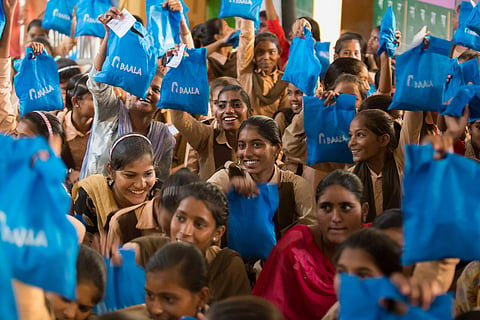

There is a very fine line that separates wanting to help and being insensitive when it comes to menstrual health. Thankfully, Project Baala is one such initiative that knows exactly how to put their money where their mouth is. We talked to its founder Soumya Dabriwal about their many initiatives, their work on reusable sanitary napkins that seem to last forever and their mission to inculcate health and hygiene knowledge among all women. Excerpts from a conversation:
How did Project Baala come to be in the first place?
We started Project Baala in 2017 and it is an innovative menstrual health solution provider. The reason why the organisation was started goes back to the time when I was a student. I was volunteering in a few slums in Africa, trying to teach them Math and English. I realised that young girls were missing 3-4 days of school every month when they got their periods and also due to the fact that they could not afford to buy sanitary pads. When I got back to Delhi, I was working in a few slum schools and I was very curious to understand if the situation was similar here as well. We found the exact same problem within the communities. The fact that the same problem could exist across two continents and was compromising the basic needs of education was something that came as a big shock for me. That is how I thought of Project Baala at first. The whole purpose was to bridge the awareness gap as well as the product gap in rural areas.
What are some of the initiatives that you have undertaken so far?
We are currently working across 16 states of India as well as across the border in Nepal and pockets of Ghana and Tanzania as well. The initiatives are based on a three-pronged solution. We provide the curated education curricula and workshops in schools, then we deliver the very technically designed reusable sanitary pads that last for two years and finally we empower the local women to become entrepreneurs and sell the reusable pads within their own networks. We have worked with 2,50,000 women and girls so far.
What are some of the challenges that you have faced along the way?
There are a lot of hurdles when it comes to a stigmatised issue like menstruation. A lot of the time, when we say we want to address the topic by getting together people from different generations, we receive a lot of backlash from the community — especially the older generation who believe that we are trying to brainwash the people with urban, modern ideas. So we had to bring forward a lot of sensitivity to the authorities and decision makers so that we all were on the same page. The second challenge was that of the acceptance of the product itself. While the product was being distributed for free, everyone was willing to accept it but as soon as they were asked to budget for it, the interest went down completely. This was the second challenge we faced.
What plans have you got coming up?
We are coming up with a module on talking to men about menstruation. That is what the future looks like for us.
